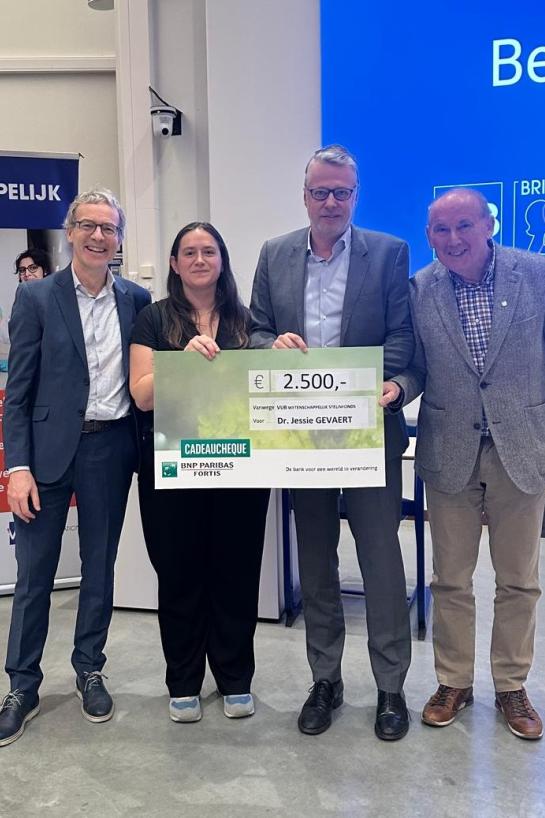
The Scientific Support Fund of the Vrije Universiteit Brussel awards the Paul De Vroede Prize to support doctoral research with societal relevance in the humanities. This time the award, along with the prize of €2,500 was presented to dr. Jessie Gevaert from BRISPO. Her dissertation, "Job Quality and the Mental Well-being of (Solo) Self-employed Workers" ("Arbeidskwaliteit en het Mentaal Welzijn van (Solo) Zelfstandigen") was completed under the supervision of Prof. Dr. Christophe Vanroelen and Dr. Deborah De Moortel. The award ceremony was held on March 26, 2025.
The full text of the dissertation is available here, and below you can read the abstract.
Photo: award ceremony; from the left: Joël Branson (Dean at Faculty of Social Sciences and Solvay Business School), Jessie Geavert (the laureate), Pieter Ballon (Vice-Rector for Research of the Vrije Universiteit Brussel) and Johny Van Steen (Secretary of the VUB Scientific Support Fund).
Over the last 50 years, major changes have taken place among the self-employed workforce. The rise of the service sector and growth of information technologies, increasing commitment to flexibilization and non-standard employment, and the emergence of a neoliberal, entrepreneurial discourse have radically transformed the nature of self-employment. The employment arrangements grouped under ‘selfemployment’ are diversifying, with an increase in solo self-employed, skilled professionals, as well as (involuntary) unskilled self-employed workers. The present dissertation discusses the impact of these changing employment arrangements within self-employment on well-being, considering the ‘quality’ of self-employed jobs as the main mediator. This main objective has been expanded upon in four, quantitative empirical papers using as a data source, the European Working Conditions Survey, and one, qualitative empirical paper based on in-depth interviews with the self-employed themselves.
The most important finding of this dissertation is that the current-day variety in selfemployment plays a part in explaining mental well-being differences. Vulnerable and precarious employment arrangements within self-employment are especially prone to negative mental well-being outcomes. Furthermore, also the availability of intrinsic job resources can, for some of these types of self-employment, be of crucial importance to explain well-being differences. Finally, this dissertation also revealed a role of the macro-economic, cultural, and social context on the job quality and mental well-being of the self-employed.
To reduce mental well-being differences among self-employed, I propose a series of recommendations revolving around recognizing the heterogeneous nature of selfemployment, investing in affordable, and easy-to-access self-employment education, reconsidering policies of labour market activation through self-employment, improving social and income protection, and the building of joint networks. Such recommendations will be able to recognize and protect those who are most vulnerable, as well as help in the prevention of severe, mental health issues through the reduction of financial worry, the increasing of information, and through building competence, confidence, and resilience among the self-employed. Altogether, this thesis advocates for the consideration of self-employment heterogeneity in both research, as well as in policy endeavors.
